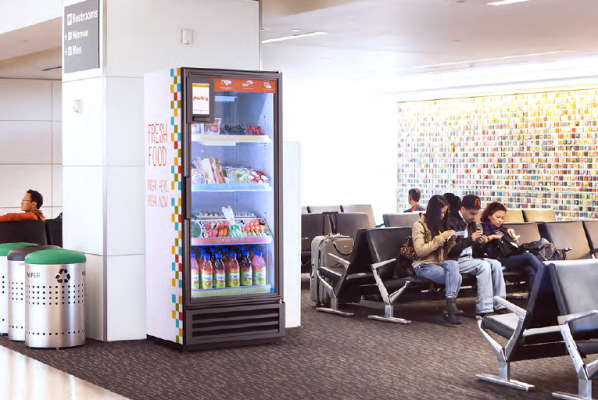Food vending machines are nothing new, but in most cases the stuff that’s available in them consists of chips, candy bars, and the occasional pre-packaged, indestructible burrito. But what if there were a way to ensure that there were healthier options available with fresh ingredients? That’s what Pantry‘s smart refrigerators were built for.
Backed by hardware incubator and seed investor Lemnos Labs, Pantry provides a refrigerator that organizations like universities, hospitals, and gyms can stock with fresh foods to be purchased at any time.
The fridge has a modified Android tablet with credit card reader attached to it, enabling customers to instantly swipe and pay for any items taken out of the fridge. They don’t even have to enter in what they took — using RFID technology, Pantry’s fridge detects what was taken out and automatically charges the card that was swiped.
In places like hospitals, which are open 24 hours but only have a cafeteria open for about a third of that time, Pantry offers up a fresh alternative to pre-packaged and less healthy foods currently available in most vending machines.
Since it knows when different food items were placed into the fridge, it can ensure the freshness of the goods sold. It also tracks inventory to let people know when items need to be restocked or replaced.
Pantry has raised $1.3 million in funding from 500 Startups, Menlo Ventures, Arsenal Venture Partners, Loic Le Meur, Nir Eyal, Georges Harik, Entry Capital, and Lemnos Labs. It also has had a couple of successful pilots in locations at Stanford Hospital and UCSF. Those organizations are looking to expand availability with additional Pantry units in their hospitals.
It’s also looking to trial the offering at local universities, including Stanford Business School and Academy of Art University, where students are frequently on the go and might not have access to healthy food options all the time.
There’s also an opportunity for Pantry to sell into fast-casual restaurant locations. Any number of places — salad and sandwich shops mostly — are faced with teeming lines of hungry customers during the lunch rush. But implementing something like Pantry could enable them to offload some of that traffic by having recently made salads or sandwiches available through its fridge.
That could mean faster checkout for customers and shorter lines. In general, though, adoption of Pantry’s refrigerators should mean better, faster food items wherever they’re deployed.
